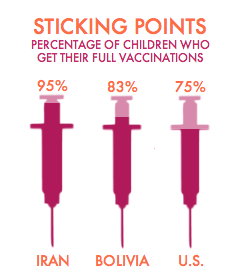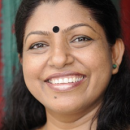
February 14, 2013 | Violence Against Women
“Do Not Be Ashamed”
Monira Rahman gives acid-attack survivors a new chance at life.

Here are the stark facts on acid attacks: 1,500 incidents globally a year. Eighty percent of those targeted are women, permanently disfigured as the result of attacks motivated by possessiveness and jealousy. Bangladesh used to be a particular hotspot for this crime; in 2002 alone there were 500 attacks, often against girls under age 18. And then Monira Rahman stepped in. Since 1999, her Acid Survivors Foundation has been working to stop the violence, and to provide medical and psychological support for victims, many whom get little help from local doctors and police officers. From her offices in Dhaka, Rahman answered our questions.
What inspired you to create the Acid Survivors Foundation?
I first met two women who had been attacked with acid in 1997 and I was amazed by their strength and courage. I wanted to work with them, to do something for them and to understand them better.
I felt that the violence was escalating to such an extent in Bangladesh and that no woman should have to live in a place where they are not safe. It is a fundamental human right that women must be free to live their lives without fear of violence.
Tell us about a particular woman who moved you.
One of the women I met in 1997 was 17-year-old Bina Akter, whose dream of becoming an athlete was thwarted when she intervened to protect her cousin from an acid attack. Bina was blinded in one eye and facially disfigured while her cousin sustained burns to her hands and body.
Both girls have now transformed their lives. Bina is studying in the USA and plans to work as a nurse in our specialist hospital for treating acid attacks in Bangladesh. Her cousin is a counselor.
Bina has helped many other survivors by speaking in public about acid attacks, campaigning for laws to tackle this issue and raising awareness of violence against women all over the world.
What is the first thing you say to a woman who has suffered this trauma?
You are not alone. You have the courage to fight this experience. This is criminal act. This is a violation of your human rights. You are not responsible for this attack. Do not be ashamed.
By some estimates your organization has helped to decrease acid violence by 40 percent in Bangladesh. How did you achieve that?
The fact that acid attacks have decreased in Bangladesh by approximately 80 percent in the past 10 years is not due to ASF alone; it takes collaboration with international development organizations, donors, the media, society and, above all, the government to collectively reduce any form of violence against women. This work has had success, compared with 500 attacks in 2002 there were 98 last year.
However, we must maintain this focus. In January there was a dramatic increase in violence against women. The severity of recent acid attacks is also disturbing: a girl studying in a college in Dhaka was recently violently attacked with acid and stabbed. She is still fighting for her life.
How can you ensure the attacks don’t start up again?
I have started working with other women’s groups to call on parliamentarians to take decisive action. In the run-up to One Billion Rising we are joining daily rallies and demonstrations; I have even been taking my son with me. On February 14 we will join thousands of survivors to condemn violence against women.
Then, on March 8, for International Women’s Day, more than 500 acid survivors will join a national rally to demand justice and a better response from the government. The rape of the student on a bus in Delhi, India has attracted worldwide debate about what provisions the justice system can have to tackle extreme violence. In Bangladesh this is a big problem, where law and order is not stable and perpetrators are taking advantage of this.
Has it been difficult working with victims of horrific violence?
I was traumatized when I started ASF. For many years I carried a bottle of water with me because I feared the work I was doing would provoke an acid attack. I couldn’t think or talk about anything other than acid violence. I am lucky that ASF provides an environment where I can express emotions of anger, sadness or joy with others.
Are others following your lead?
Since seeing the success of ASF’s work with survivors, six countries have developed similar organizations. We have also campaigned for a specific law to combat acid violence in Bangladesh, which has been replicated by two other countries. ASF’s hospital services have provided the best national medical treatment for acid attacks in a low resourced set up and we are now hoping to act as a center of excellence globally. We are currently fundraising to develop ASF into a complex with a skin bank, rehabilitation center and a shelter for those who are experiencing severe security problems.
What makes you feel optimistic?
I am always impressed by the spirit of survivors. They do not want pity from the public; all they ask for is cooperation. I speak to women who ask me to help them find a job from their hospital beds. They want to lead independent lives and so one thing we can do is support them with accessing a livelihood.
How to Help
The Acid Survivors Foundation is a partner of international development organization VSO, which works through volunteers to tackle poverty in more than 30 of the world’s poorest countries. For more information on VSO, please visit www.vso.org.uk.